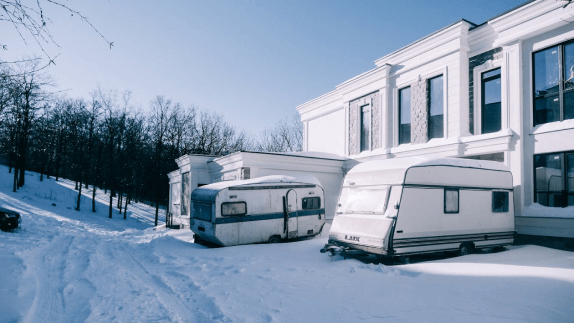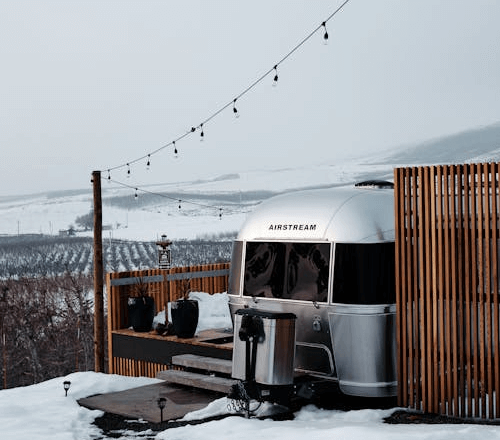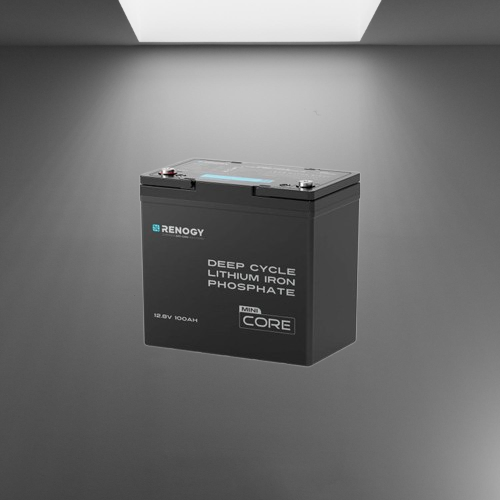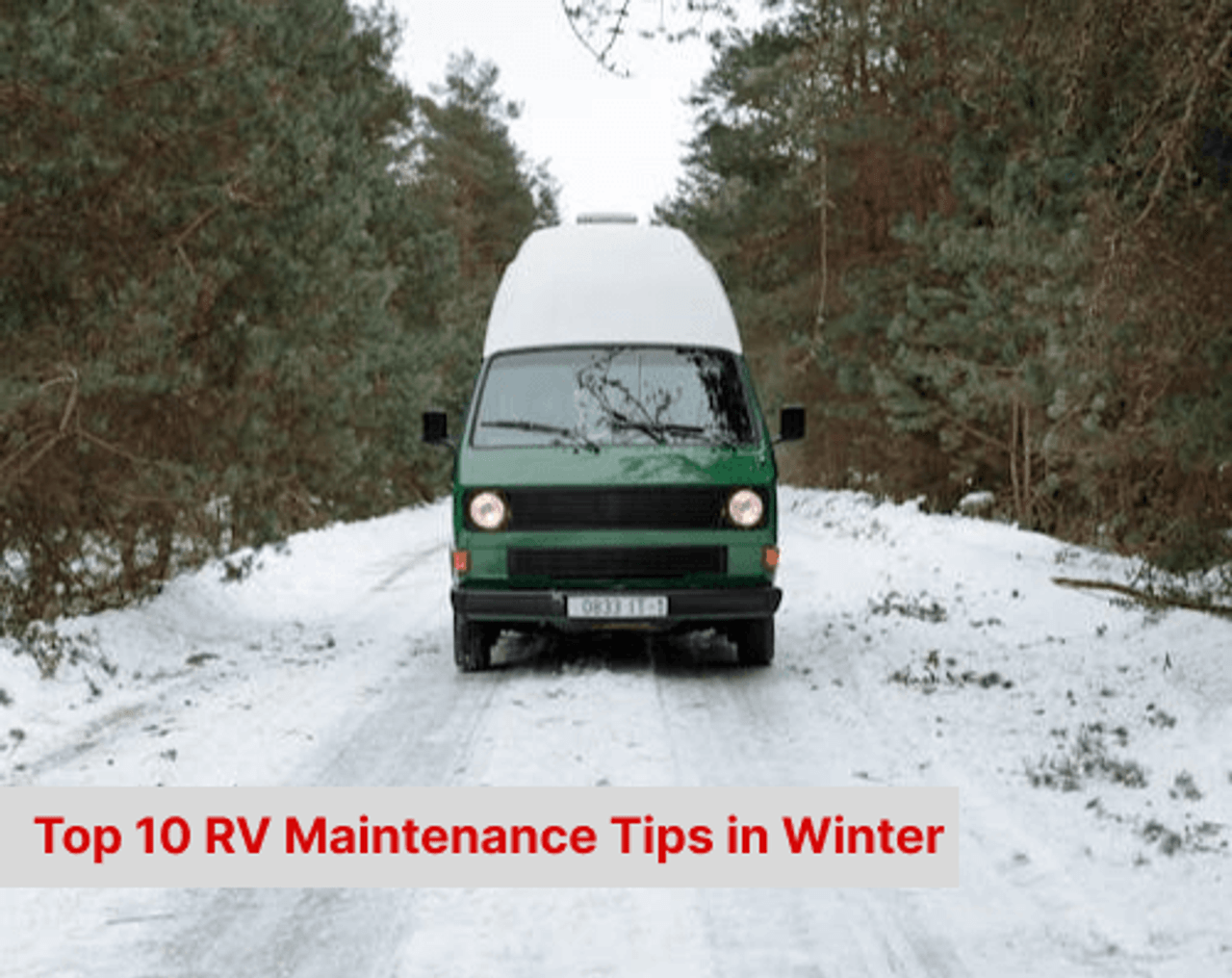RV Maintenance Tips in Winter: Top 10 Tips for a Smooth Ride Next Spring
Winter can be harsh on your RV, and proper RV maintenance during the cold months is crucial for ensuring a worry-free adventure when spring arrives. One of the most critical aspects of winter storage is maintaining your RV's electrical system and batteries. While many RV owners focus on winterizing plumbing and checking tires, they often overlook the importance of keeping their batteries properly charged during the off-season. This is where a reliable charging solution becomes invaluable.
Renogy 40A DC-DC Battery Charger with MPPT keeps you powered on the go. It defaults to DC input while driving and automatically switches to solar charging when parked, and compatible with LiFePO4, Gel, Flooded, and Sealed Lead Acid batteries.
This article discusses proper RV maintenance and winterization tips as we start the freezing season. By following our top 10 maintenance tips and implementing a smart charging strategy, you can keep your RV in good condition so that once the weather is warm again, you are ready to hit the road with minimal repairs and maintenance costs. Keep reading!
Benefits of RV Maintenance in Winter

RV winterization is important for RV-ers who live in winter climate zones. Winterizing your RV keeps its working condition good after the winter season is over. If neglected during winter the RV is susceptible to water damage, pest infestation, leakages, and molds. The main objective of RV winterization is to keep it in proper working condition until next spring.
Here are a few reasons why you should winterize your RV.
1. Keeps the Pests and Rodents Away
As the winter starts, rodents and critters will scamper for safety and warmth. One of the places they are likely to hide is inside your RV. The rodents will start gnawing on your cushions, curtains, cabinets among other valuables in your RV. Cleaning and pest-proofing your RV will prevent pests and rodents from infesting your RV.
2. Protects the Plumbing System
Another benefit of winterizing RV is protecting the plumbing system which is prone to freezing. Once the temperatures start plummeting, the water in the tanks and pipes will freeze, causing the pipes to burst. Winterizing involves draining all the water from the RV, including the greywater tanks.
3. Battery Life Maintenance
Your battery’s performance and longevity are affected during extreme temperatures. When winterizing your RV, remove the battery and safely store it in a cool and dry place. Also, only store the battery when it's fully charged. Storing the battery when it's not fully charged causes the liquid to freeze, thus leading to case damage or cracking.
Top 10 Tips for RV Maintenance in Winter

The following winter pre-storage recommendations will help keep your RV in good condition as you await spring to resume adventures.
1. Drain the Water System
One of the most important steps in preparing your RV for the winter is draining and cleaning the water systems. If you leave water in the RV's plumbing system, it will turn into ice. Ice on the pipes expands, thus causing breakage to the lines and fittings.
The costs of repairing the RV plumbing system are high and time-consuming. Once you have drained all the water, use RV antifreeze to keep it in good condition until the next use.
2. Clean the Interior of the RV
Before you store your RV away, remove all food items from the RV. Remove all the supplies such as soaps, handwash, toothpaste, and all other items. Food and essential items may freeze and crack and once they melt, they can leave behind a trail of mess.
Remove all the medicine and ointments from the cabinets. Empty the freezer and the fridge and leave their doors open to prevent mildew and mold from developing. Vacuum the floors and wipe clean all the surfaces.
3. Prepare the Exterior
The next important step in keeping your RV in good condition is ensuring the exterior is in good condition. Conduct a thorough inspection of the windows, seams, sidewalls, exterior doors, the roof, and the access panels. If there are any cracks or holes, recaulk and reseal them. Ensuring the exterior is in good condition ensures water cannot leak inside the RV. Remember to use the right sealant for your RV.
4. Pest-Proof Your RV
During winter, pests and rodents may find their way into your RV. Pests, especially rodents, are destructive and tend to access the RV through small openings of the RV such as where the cords pass on the RV walls. Rodents are particularly attracted to the auxiliary electrical power cable and they chew on them. You can place traps and other pest repellants in and around your RV to prevent the pests from accessing your RV while in storage.
5. Keep the Tires Protected
Inspect the tires of your RV and ensure they are in good condition. Clean them up by removing any dirt or debris.
UV rays and long exposure to freezing temperatures tend to damage the tires. Therefore, cover them using specialized tire covers. Also, inflate the tires up to the maximum pressure recommended before storage.
Another option to consider when dealing with tires is RV skirting. It safeguards and insulates the tires and the RV's underside throughout the winter.
Additionally, when storing the RV away for the winter, place thick plywood under each tire to keep it from touching the ground.
6. Take Care of the Battery
Another crucial aspect of RV maintenance and storage during winter is the batteries. Extreme cold temperatures affect the performance and life of the battery.
Before you store the RV away, disconnect and remove the batteries. Keep the batteries stored in a cool and dry place. Also, you must monitor the battery every four to six weeks using a multimeter or a voltmeter to ensure they are still intact.
7. Use Fuel Stabilizer
According to The Wall Street Journal, gas goes bad with time, causing a sticky resin deposit. The sticky deposits are formed due to oxidation and they damage the engine. Therefore, to prevent this, add a fuel stabilizer to prevent these gummy deposits from forming.
Read the instructions before adding the stabilizer to the gas tank. Then, run the engine and the generator for a few minutes to allow the stabilizer to distribute well into the fuel system. Also, consider changing the engine oil and filters before storing the RV away.
8. Use High-Quality RV Cover
If you plan to store your RV outside, invest in a high-quality cover specially designed to adequately cover your RV. The cover protects your RV from damaging UV rays and snow deposits.
Additionally, a good quality RV cover protects it from wind damage, bird droppings, and tree saps. Consider using an RV cover specially designed for the winter climate.
9. Pick the Right Storage Location for Your RV
One of the key considerations when storing your RV for the winter is the ideal location. If you are storing the RV outside, consider using a good-quality cover.
Also, if you are storing the RV in a yard or driveway, conduct due diligence on the county or city codes. Also, check the homeowners association rules and regulations to ensure the duration of time you can store your RV.
Avoid storing your RV under trees and keep it covered. If you choose to store it in a garage, ensure it is well-covered on all sides and has a wide access door. Also, consider having security features in the garage such as temperature control, regulated access, and cameras. The location you choose for the RV storage must have proper drainage to prevent water from flooding around your RV.
10. Conduct Regular Checks and Maintenance
Conduct regular checks and maintenance of your RV throughout the winter. Lubricate the moving parts such as the hinges, slide-outs, and locks to prevent corroding or seizing during storage. Also, routinely inspect the RV for any leaks, storage, and other parts of the RV.
The Best Battery Chargers for Winter
As you shelve your RV away awaiting the winter season to end, one of the things you must keep in good condition is the battery. Freezing weather increases the battery resistance and significantly minimizes the efficiency of the car’s alternator in charging it. The Core Mini - 12.8V 100Ah Lithium Iron Phosphate Battery offers low-temperature charging protection, which is perfect for winter storage. Plus, it's compact and lightweight, so it’s easy to store in your RV without taking up too much space.

If you're worried about freezing temperatures damaging your RV's battery, the Renogy 40A DC-DC Battery Charger with MPPT is a great solution. It keeps your battery charged while driving, and when you're parked, it switches to solar power. This helps ensure you won’t be left with a dead battery if you wanna a winter RV camping.

Conclusion
As you wrap up your winter RV maintenance, keep in mind that taking a few extra steps now can save you a lot of trouble when spring rolls around. Whether it’s protecting your battery from the cold or ensuring your systems stay in top shape, regular maintenance will make your next RV adventure a smooth and stress-free experience. By staying on top of winter care, you’ll be ready to hit the road as soon as the weather warms up. So, take the time now, and enjoy many more worry-free trips in the future!
RV Maintenance FAQs
1. Is it advisable to leave the water faucets open after RV winterization?
Keep the faucets open to allow any remaining water to drain out. Also, once you add the antifreeze, opening the faucets helps in distributing it throughout the plumbing system of your RV. If you close the faucets, the residual water may freeze inside the pipes, thus causing long-lasting problems in the plumbing system.
2. Is it necessary to cover my RV?
If you are storing your RV outside, you must keep it covered throughout the winter. The cover shields your RV from elements such as ultraviolet sun rays, wind, bird droppings, ice, and tree sap.
3. What are the lowest temperatures for winterizing RV?
When the temperatures drop below 0 degrees, consider winterizing your recreational vehicle. If you are not using the RV, the freezing temperatures will cause the water in the tanks and pipes to freeze, which leads to damage.











